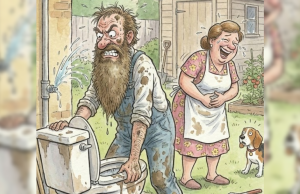
A parent’s love for a child runs infinitely deep. But there often comes a stage in life when experience teaches us the painful difference between genuine love and emotional harm. Many older parents hear words that appear harmless on the surface, yet quietly carry judgment, control, or cold indifference.
This is not about loving less—it’s about recognizing when a relationship becomes unhealthy. In later years, you deserve calm, dignity, and sincere connection, not constant criticism or humiliation disguised as concern.
Distance yourself from a child if they repeatedly use these 7 phrases:
1. “You’re to blame for who I am.”
When a grown child blames their past for their current failures, they are refusing responsibility. Everyone faces hardships, but permanent blame keeps parents trapped in endless guilt.
Hidden emotional manipulation.
Do not argue. Every adult is responsible for their own choices. Do not carry a burden that no longer belongs to you.
2. “You’re old and you don’t understand.”
This phrase dismisses your voice and invalidates your perspective. Age does not weaken wisdom—it strengthens it.
Generational disrespect.
Hold your self-respect. You don’t need to convince those who believe aging reduces your value.
3. “I didn’t ask you to raise me.”
Few words cut deeper. This statement rejects years of sacrifice, effort, and unconditional love.
Deep ingratitude and lack of empathy.
Do not defend yourself. A person who cannot acknowledge what they received will never appreciate what you give now.
4. “You’re exaggerating” or “You’re always complaining.”
These responses are meant to silence your feelings and make you doubt your emotional truth.
Emotional invalidation.
Trust your feelings. If something hurts you, it is real. Don’t train yourself to stay quiet just to keep the peace.
5. “You owe me everything I have.”
Parental love is not a lifelong debt for children to collect. This is emotional blackmail.
Financial or emotional manipulation.
Set firm boundaries. Love is not a transaction.
6. “I don’t need your opinion.”
While no one is required to follow advice, completely dismissing your voice reflects arrogance and disrespect.
Disregard for your life experience.
Stop forcing your words on deaf ears. Those who devalue your voice deserve calm distance, not silent suffering.
7. “You’re no longer good for anything.”
This is among the most painful things a child can say. It erases your entire life, your struggle, and your worth.
Direct verbal abuse.
Create space. Lost respect is restored through boundaries, not tears.
Tips for Aging Parents
Never normalize disrespect, even when it comes from your own child. Love should not require enduring pain.
Learn to say “no” without shame. At this stage of life, your peace matters more than winning arguments.
Surround yourself with those who uplift you—friends, neighbors, and kind family members. Healthy relationships keep the spirit young.
Protect your self-worth. Do not let someone else’s words define your value.
Remember: real love does not wound, degrade, or blame.
Reflect if you are a child
Before speaking harshly to your parents, remember what they gave you—sleepless nights, sacrifices, protection, guidance, and countless unseen acts of love.
If you have ever wounded them with your words, it is not too late to seek forgiveness with humility. There is a unique sadness in realizing too late that the voice you ignored yesterday has become the silence you long for today.

















